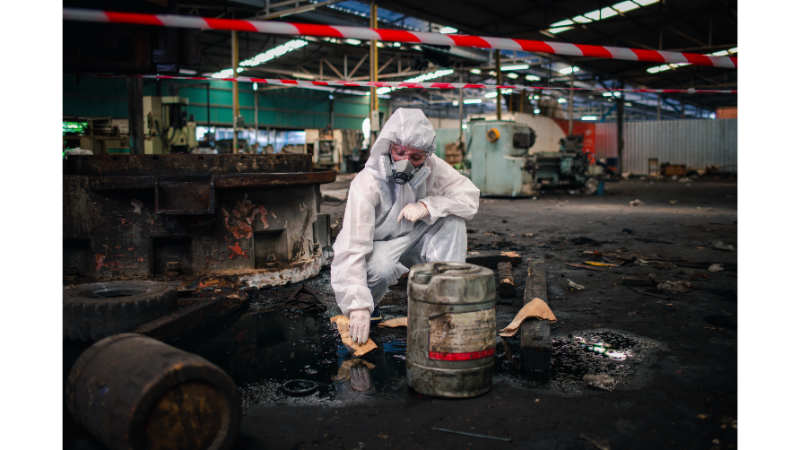Hazardous waste management is one of the biggest environmental and legal responsibilities of modern industry. Hazardous waste is generated in many sectors such as manufacturing plants, hospitals, the chemical industry and mining. When released directly into the environment, it causes serious health problems and ecological destruction. Therefore, hazardous waste must be disposed of safely. This process protects human health while ensuring environmental sustainability. Burkasan eases the burden of hazardous waste management for businesses by developing integrated and sustainable systems. It minimizes environmental impacts.
In this article, the definition of hazardous waste, its environmental and health impacts will be discussed. In addition, proper management methods and solutions offered by Burkasan will be examined.
Table of Contents
- What is Hazardous Waste?
- Effects of Hazardous Wastes on the Environment and Human Health
- Why is Hazardous Waste Management Important?
- Hazardous Waste Management Solutions with Burkasan
- Hazardous Waste Management Guide for Industry and Institutions
- Frequently Asked Questions
- Conclusion
What is Hazardous Waste?
May contain harmful, toxic, explosive or corrosive components. It also has the potential to harm the environment by containing biohazardous substances. These wastes pose great risks to human health and the ecosystem. Improper disposal of these wastes leads to air, water and soil pollution. It also disrupts the balance of the ecosystem. It causes serious health problems in humans.
Often generated in industrial production, the health sector and the chemical industry. It also occurs in sectors such as mining, agriculture and construction. In addition, household waste also includes hazardous substances. For example, batteries, paint residues, cleaning products, electronic waste and some medicines fall into this category.
These wastes are divided into various categories according to their physical and chemical properties:

Biohazardous Waste: Infected waste from hospitals and laboratories.
Chemical Hazardous Waste: Toxic chemicals, heavy metals and solvents used in industrial production.
Radioactive Hazardous Waste: Waste from nuclear power plants and radiotherapy in the health sector.
Flammable and Explosive Wastes: Petroleum derivatives, gases and other flammable substances.
Effects of Hazardous Wastes on the Environment and Human Health
Hazardous wastes have major negative impacts on the environment and human health. These wastes cause irreversible damage. Therefore, it is vital to manage these wastes properly. Because hazardous wastes left uncontrolled disrupt ecosystems by causing air, water and soil pollution. Thus, agricultural areas become inefficient. In addition, human health is seriously threatened. In particular, toxic substances emitted from these wastes cause respiratory problems.

Impacts on the Environment:
Water Pollution: Hazardous wastes mix with water resources and pollute drinking water resources. This leads to the death of aquatic life.
Soil Pollution: Chemical and industrial wastes leach into the soil, making agricultural areas inefficient. It also causes harmful substances to enter the food chain. This reduces the quality of agricultural products and indirectly affects human health.
Air Pollution: Flammable and volatile hazardous wastes cause air pollution by releasing toxic gases into the atmosphere. Especially hazardous gases from industrial plants cause acid rain and respiratory diseases.
Effects on Human Health:
Respiratory Diseases: Chemical and radioactive waste in the air triggers respiratory diseases. The risk of serious conditions such as asthma, bronchitis and lung cancer increases.
Skin and Eye Irritation: Direct contact causes skin burns. It can cause allergic reactions and eye irritation. Individuals working with chemical wastes are particularly exposed to these risks.
Chronic diseases and poisoning: Heavy metals and toxic compounds accumulate in the body. This leads to organ damage and weakens the immune system. Prolonged exposure to such waste increases the risk of developing cancer.
The uncontrolled release of hazardous waste into the environment poses a major environmental and health problem. This situation threatens not only the present but also future generations. Therefore, these wastes need to be managed appropriately. Furthermore, their disposal is an environmental issue.
Why is Hazardous Waste Management Important?
Hazardous waste must be managed safely and correctly. This process protects the environment and safeguards human health. This management does not only cover the disposal of waste. It also includes acting in accordance with the principles of recycling, reuse and sustainability.
Importance for the Environment and Ecosystem
Prevents Environmental Pollution: Hazardous wastes left uncontrolled pollute water resources, soil and air. This causes irreversible damage to the ecosystem.
Protects Biodiversity: Toxic wastes mix with water resources and negatively affect marine and land ecosystems. This poses a great threat to the creatures living in these ecosystems. Waste that is not managed properly negatively affects agricultural areas and natural life, leading to a deterioration of the ecological balance.
Supports Sustainable Resource Utilization: Recycled or reused waste reduces the consumption of natural resources and relieves pressure on the environment.

Importance for Industry and Businesses
Legal Compliance and Avoiding Penalties: Businesses face high fines if they do not comply with Environmental Legislation and Hazardous Waste Regulations. Proper waste management increases the safety of companies in legal processes.
Increases Occupational Safety: Proper storage and disposal of hazardous waste ensures the safety of employees by preventing accidents such as fire, explosion or poisoning in the workplace.
Strengthens Corporate Reputation: Businesses that adopt environmentally friendly practices create a more reliable and sustainable brand image for both customers and investors.
Hazardous Waste Management Solutions with Burkasan
With 25 years of experience, Burkasan offers comprehensive waste management solutions to prestigious brands across Turkey, minimizing environmental impacts. Thus, it alleviates the waste management responsibilities of enterprises and produces environmentally friendly solutions.
Burkasan’s Waste Management Services:
Personnel Employment and Management: Provides support to businesses with the employment and effective management of experienced personnel in waste management processes.
Vehicle, Machinery and Equipment Supply: Provides the necessary vehicles, machinery and equipment for the safe and efficient collection, transportation and processing of waste.
Audit, Reporting and Training: Increases the effectiveness of waste management processes through continuous auditing, detailed reporting and staff training.
Logistics Organizations: Ensures operational efficiency by planning logistics organizations in waste collection and transportation processes.
Product Destruction Processes: Helps businesses fulfill their responsibilities by providing safe and legally compliant product disposal services.
Waste Management in Free Zones: Provides customized waste management solutions for businesses operating in free zones.

With these services, Burkasan supports businesses in achieving their sustainability and environmentally friendly goals, while ensuring legal compliance and operational efficiency. It also creates a safe working environment with its zero work accident target and commitment to product safety.
Hazardous Waste Management Guide for Industry and Institutions
Waste management for industry and institutions requires an approach that prioritizes environmental protection and human health. Burkasan recommends the following steps for the proper management of such wastes:
- Identifying the Waste Source: Identifying the source of hazardous waste is the first step in determining appropriate management strategies.
- Classification of Waste Type: Wastes should be classified based on the substances they contain. Appropriate disposal methods should then be determined for each type.
- Selection of Recycling and Disposal Methods: Wastes should be processed in line with recycling opportunities or disposed of safely.
- Compliance with Legal Regulations: Hazardous waste management must be carried out in accordance with legal regulations. It must also comply with environmental laws.
Frequently Asked Questions
Hazardous waste can harm the environment and human health because it contains chemical, biological, radioactive or flammable components. Such wastes are toxic, corrosive, explosive, infectious or radioactive. If mismanaged, they create air, water and soil pollution and cause serious health risks.
Burkasan offers integrated solutions to safely manage waste and minimize its environmental impact.
Hazardous waste must be treated with safe disposal methods and disposed of without harming the environment. This should be done through recycling and disposal methods.
Businesses must comply with regulations set by the Ministry of Environment, Urbanization and Climate Change. The Waste Management Regulation outlines how businesses must dispose of their waste. Additionally, the Regulation on the Control of Hazardous Waste provides specific guidelines for handling hazardous materials. They are also required to regularly report on the amount of waste and disposal methods.
Yes, some hazardous waste can be recycled. Waste oils, heavy metals, some chemical components and electronic wastes can be reused through certain processes. The recycling process both preserves natural resources and reduces waste management costs.
Household hazardous waste includes batteries, electronic waste, pharmaceutical waste, and chemical cleaners. These should be delivered to municipal or specialized waste collection points. Disposing of such waste in the garbage poses serious environmental and health threats. Similarly, pouring it down the sink can cause significant harm.
Conclusion
In conclusion, companies that act with environmental awareness must properly plan their waste management processes. This is essential for protecting human health and ensuring the sustainable use of natural resources. Improperly managed waste not only damages the environment. It also threatens public health, ecological balance, and the quality of life for future generations. Therefore, the safe and controlled disposal or recycling of hazardous waste is not just a legal obligation. It is also a corporate responsibility.
Burkasan supports businesses in complying with legal regulations. It also minimizes environmental risks through its integrated hazardous waste management solutions. With the help of advanced technologies, waste is classified at its source and safely processed. It is then either disposed of or transformed into economically valuable products. This method increases resource efficiency and reduces the carbon footprint. It also contributes directly to sustainable development goals.
Considering all these factors, the proper, professional, and conscious management of hazardous waste is essential. It plays a vital role in achieving environmental sustainability and protecting ecosystems.
You can visit our blog page to explore more of our content.bility.

